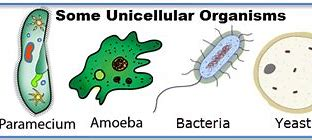
Name two unicellular organisms.
Answer
597.9k+ views
Hint: Uni= single. The organisms that have a single cell. Two such organisms are to be named here that contain a singular cellular identity.
Complete answer:
The unicellular organisms are the single-celled organisms where all the life processes take place in that particular single cell. From digestion to excretion to nutrition, the organism survives as a single cell. All the unicellular organisms are microscopic and are impossible to see with naked eyes. The single-cell may be naked or covered by a cell wall.
Unicellular organisms are both prokaryotes and eukaryotes. The unicellular prokaryotes are placed under the Kingdom Monera and some of the examples include Bacteria.
The unicellular eukaryotes are placed under the kingdom Protista and examples include Amoeba and Paramecium.
Additional Information:
Some characteristics of unicellular organisms.
-Asexual reproduction is the main mode of reproduction. It involves binary fission (Amoeba and Paramecium) and plasmogamy and budding.
-The genetic material is not enclosed within a nuclear membrane.
-If the flagella are present it is composed of flagellin protein.
-The unicellular prokaryotes have 70S ribosomes, and the unicellular eukaryotes have 80S ribosomes.
-They may or may not include a rigid cell wall. Bacteria have a cell wall made of peptidoglycan.
-Amoeba is characterized by the formation of pseudopodia for the injection of food and locomotion.

Note:
-The unicellular organisms are cosmopolitan. Some of them are found in extreme environments known as extremophiles.
-Yeast is a unicellular fungus.
-Bacteria are the sole member of Kingdom Monera.
Complete answer:
The unicellular organisms are the single-celled organisms where all the life processes take place in that particular single cell. From digestion to excretion to nutrition, the organism survives as a single cell. All the unicellular organisms are microscopic and are impossible to see with naked eyes. The single-cell may be naked or covered by a cell wall.
Unicellular organisms are both prokaryotes and eukaryotes. The unicellular prokaryotes are placed under the Kingdom Monera and some of the examples include Bacteria.
The unicellular eukaryotes are placed under the kingdom Protista and examples include Amoeba and Paramecium.
Additional Information:
Some characteristics of unicellular organisms.
-Asexual reproduction is the main mode of reproduction. It involves binary fission (Amoeba and Paramecium) and plasmogamy and budding.
-The genetic material is not enclosed within a nuclear membrane.
-If the flagella are present it is composed of flagellin protein.
-The unicellular prokaryotes have 70S ribosomes, and the unicellular eukaryotes have 80S ribosomes.
-They may or may not include a rigid cell wall. Bacteria have a cell wall made of peptidoglycan.
-Amoeba is characterized by the formation of pseudopodia for the injection of food and locomotion.

Some unicellular organisms
Note:
-The unicellular organisms are cosmopolitan. Some of them are found in extreme environments known as extremophiles.
-Yeast is a unicellular fungus.
-Bacteria are the sole member of Kingdom Monera.
Recently Updated Pages
Master Class 10 Computer Science: Engaging Questions & Answers for Success

Master Class 10 General Knowledge: Engaging Questions & Answers for Success

Master Class 10 English: Engaging Questions & Answers for Success

Master Class 10 Social Science: Engaging Questions & Answers for Success

Master Class 10 Maths: Engaging Questions & Answers for Success

Master Class 10 Science: Engaging Questions & Answers for Success

Trending doubts
What is the median of the first 10 natural numbers class 10 maths CBSE

Which women's tennis player has 24 Grand Slam singles titles?

Who is the Brand Ambassador of Incredible India?

Why is there a time difference of about 5 hours between class 10 social science CBSE

Write a letter to the principal requesting him to grant class 10 english CBSE

A moving boat is observed from the top of a 150 m high class 10 maths CBSE




